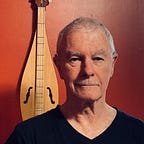Noises Off: The Sound of “Sound of Metal”
Sound of Metal, an Oscar-nominated Netflix film about a thrash-rock drummer whose hearing dies, is a long shot to grab the Best Picture or Best Actor statuette. But if it doesn’t win Best Sound for sound designer Nicholas Becker, the Motion Picture Academy should just fold its tent and end all that “And the winner is. . . .” business.
Becker and his creative team of recorders, mixers and editors don’t just do a (pardon the expression) bang-up job, they accomplish something unique in the history of film: They approximate for a hearing audience what it’s really like to be deaf or severely hearing impaired.
I know whereof I speak. Like Sound of Metal drummer Ruben Stone (Oscar-nominated Riz Ahmed), I experienced a sudden, catastrophic hearing loss that left me panicked and angry, and I continue to struggle with communication problems in spite of a cochlear implant. (I also was auditioned for the part of Ruben’s deaf mentor, a role that went to the marvelous, Oscar-nominated Paul Raci, but enough about that.)
There are a number of good films about deaf people. Children of a Lesser God comes immediately to mind, and Love is Never Silent and, of course, The Miracle Worker. But in all those, the viewer remains largely outside the characters’ deafness.
Sound of Metal takes you inside — ingeniously — by shifting and juxtaposing soundscapes.
Consider the initial illustration of Ruben’s hearing loss. The “before” is a morning scene in which he climbs out of bed early to make breakfast for himself and his girlfriend/bandmate. We hear the grumble and whirr when he runs his juicer, the gurgle, pop and hiss of the coffee maker. The “after,” a day later, shows the same kitchen appliances at work from Ruben’s new, bewildered perspective: They make not a sound.
It’s a vividly accurate rendering of an experience that I and thousands of other hearing-impaired people have had.
Another illuminating scene has Ruben in an audiologist’s sound booth having his crashed hearing evaluated. Inside the closed booth with Ruben, we hear the list of words the audiologist reads to him as muffled, feeble, mostly indecipherable. When the camera shifts to the audiologist, outside the booth, every noun and verb is clear.
Becker and director Darius Marder use such juxtapositions repeatedly. Inside Ruben and his girlfriend’s tour bus, we experience his near-soundless world. Quick exterior cutaways to the rolling bus reveal a noisy highway. When he attempts to drum again, we see his muscular pounding but hear only the dullest thuds. Occasionally Marder cuts away to ambient nature shots, reminding us even “quiet” places are alive with sound.
The most poignant sequence for me is Ruben at a big birthday party. Assaulted by the cacophony of clattering dishes and cocktail chatter, dismayed by his intense sense of isolation in a crowd, he retreats to the sidelines. He hides. Been there. Done that. And so have so many of us whose hearing has taken a serious dive.
I have a minor quibble or two about the screenplay. In the interest of telling a tight story, the script shortchanges the complexities of sensorineural hearing loss and the likely trajectory of treatment. And after establishing Ruben’s limited financial resources, it has him doing things that make you go, “How the heck did he afford that?”
As noted, though, these are minor objections. Sound of Metal is not a tutorial about deafness, hearing aids or cochlear implants. It’s a drama about making peace with yourself, about finding the quiet within. And it’s hard to imagine anyone who streams it coming away without a sharply heightened awareness of sound, of what it is to be surrounded by it, immersed in it, to take it for granted . . . and not.
Noel Holston is the author of Life After Deaf: My Misadventures in Hearing Loss and Recovery, a memoir published by Skyhorse and available via Amazon.com, Target.com and other online booksellers as well as your local public library.
